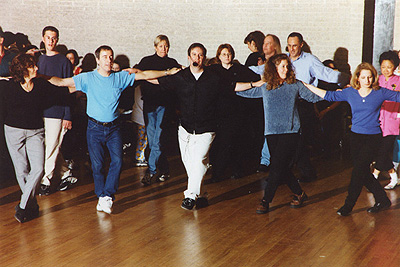
|
|
Don Schillinger leads
Rak-Dan dancing at Temple Beth Hillel-Beth El. |
|

Israeli Dancing For Darfur
Rak-Dan raises awareness.
Temple Beth Hillel-Beth El will co-sponsor a fundraiser "Israeli Dancing for Darfur"
to raise awareness of the crisis in Darfur and support the Save Darfur Coalition.
The event will be held on Sunday, September 2, 2007 from 4:00 pm to 10:00 pm at
Temple Beth Hillel-Beth El, at 1001 Remington Road in Wynnewood, Pennsylvania.
Activities include Israeli dancing with RAK-DAN for dancers of all ages and abilities. Family dancing
time from 4:00 pm to 6:00 pm is great for beginners, kids and people who like easy Israeli dances, circle
dances and general silliness. There will also be games, and a kosher, dairy dinner will be served from 6:00 pm to 7:00 pm. Israeli dancing continues after dinner until
10:00 pm for those who like camp-style, oldies dances and lots of fun.
Reservations for dinner are strongly encouraged. Anyone is welcome. If you cannot come, please consider making a donation to the Save Darfur Coalition.

|
|
Everyday, the 2.5 million
people chased from their homes in Darfur face the threat of starvation, disease, and rape, while the few
lucky enough to remain in their homes risk displacement, torture, and murder. (Save Darfur Coalition) |
|
The conflict in Darfur is literally rooted in the soil.
Most of the region's 6 million
people are farmers and herders, who cling to the valleys where the soil is less sandy or nomadic grazers,
who migrate between the arid north and the south, which blooms green after the rains every August. Though
most of Darfur's farmers are African and its nomads Arab, the two groups have mixed easily. Centuries of
intermarriage have blurred the most obvious distinctions: nearly all Darfurians are black, Muslim and speak
Arabic.
Over the past two decades, though, persistent drought has forced the Arabs to move to more arable
lands, straining relations with the Africans. In the late 1980s, competition for turf began to turn violent. Light
arms poured into the region from neighboring Chad and the Democratic Republic of Congo, leading to
occasional massacres. Hostilities simmered for more than a decade. But the spark for war came in April
2003, when, following two months of occasional raids on villages, African rebels from a group calling itself
the Sudan Liberation Army (SLA) swept into the tumbledown airport in the town of al-Fashir, killed 75
Sudanese government soldiers, shot up four military aircraft and kidnapped the air force chief, Major General
Ibrahim Bushra. The rebel group claimed that the raid was a protest against both the government's neglect of
Darfur and an increasing Arab militancy.
In response, Sudanese President Omar al-Bashir called on local tribes to crush the rebellion. The most
eager recruits came from small groups of Arab nomads who saw an opportunity to grab land and livestock
under the banner of a state-sanctioned military operation. Locals dubbed the fighters Janjaweed, a name
that loosely means "devils on horseback" and has long been used to describe the region's bandits.
By August 2003 the Janjaweed had begun attacking not only the SLA fighters but also Darfurian
civilians, who it said were aiding the insurgency. The conflict quickly descended into ethnic cleansing, say
human-rights observers, with the Janjaweed attacking and driving out people on the basis of ethnicity.
Darfur's largest Arab tribes refused to take part in the fighting, and many Africans did not support the
rebels. But the battle lines had been drawn: Arab against African. "I think the Sudanese government thought
they could sort out the problem quickly," says Cynthia Gaigals, Care International's advocacy coordinator for
Sudan. "But it soon became something much bigger."
Can we stand idly by?
For additional information, please go to the
TBHBE website or contact Rie Brosco,
610-649-2277 or Naomi Segal.
This program is underwritten and supported by TBHBE, the TBH-BE Men’s Club, Sisterhood and Youth-School Community; Kol Tzedek Synagogue; Ben & Jerry’s Ice Cream & Chocolates; Kehillah of Lower Merion; R & R Produce; Buy the Dozen Bakery, Rie Brosco and Naomi Segal.
All of the money collected will be donated to the Save Darfur Coalition.
Did you enjoy this article?
If so,
- share it with your friends
so they do not miss out on this article,
- subscribe
(free), so you do not miss out on the next issue,
-
 donate
(not quite free but greatly appreciated) to enable us to continue
providing this free service. donate
(not quite free but greatly appreciated) to enable us to continue
providing this free service.
If not,
|